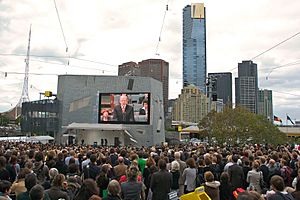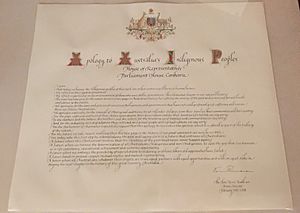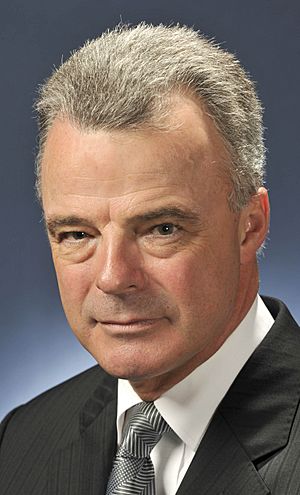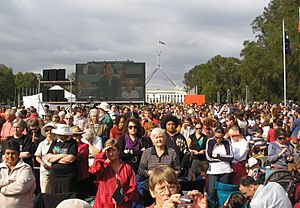Apology to Australia's Indigenous peoples facts for kids
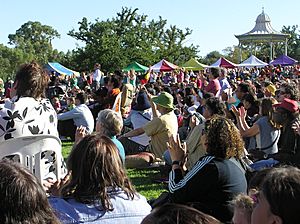
On February 13, 2008, the Australian Parliament said a formal sorry to Indigenous Australians. This apology was for the forced removal of Aboriginal and Torres Strait Islander children from their families. These children are often called the Stolen Generations.
Australian federal and state governments had taken these children from their families. Prime Minister Kevin Rudd gave this apology. It is also known as the National Apology or simply The Apology.
Contents
Why the Apology Happened
The Idea of Saying Sorry
A report called Bringing Them Home was released in 1997. This report suggested that the Australian Government should officially apologize. It said that past government rules had separated Indigenous children from their families because of their race.
The Prime Minister at the time, John Howard, received this report. However, he did not want to use the word "sorry". He believed an apology from Parliament would make people feel guilty for things that happened before their time.
Instead, he worked on a "Motion of Reconciliation". This was a statement aiming to bring people together. He worked with Senator Aden Ridgeway, who was the only Aboriginal person in the federal parliament then.
Motion of Reconciliation
On August 26, 1999, Prime Minister Howard presented the Motion of Reconciliation. It said Parliament felt "deep and sincere regret" that Indigenous Australians had suffered. It also mentioned the "hurt and trauma" many Indigenous people still felt.
The motion called this mistreatment the "most blemished chapter" in Australian history. It said Parliament was dedicated to "reconciliation".
The main opposition party, the Australian Labor Party, wanted a full apology. Their leader, Kim Beazley, tried to change Howard's motion to an apology, but it didn't pass. The Howard Government continued to oppose a full "apology" until their term ended in 2007.
A New Government's Promise
After the 2007 election, Kevin Rudd became the new Prime Minister. On December 11, 2007, he announced that his government would apologize to Indigenous Australians. He said the exact words would be decided with Aboriginal leaders.
The Liberal Party, the main opposition, had different views. Their leader, Brendan Nelson, first worried an apology might create a "culture of guilt". But other important Liberal members, like Malcolm Turnbull and Peter Costello, supported an apology.
Former Liberal minister Judi Moylan said: "I think as a nation we owe an apology. We shouldn't be thinking about it as an individual apology — it's an apology that is coming from the nation state because it was governments that did these things."
Eventually, the Liberal Party agreed to support the apology. This meant both major parties agreed on the need for it.
Why an Apology Was Needed
Lyn Austin, who leads Stolen Generations Victoria, explained why the apology was so important. She shared her own experience as a stolen child:
I thought I was being taken just for a few days. I can recall seeing my mother standing on the side of the road with her head in her hands, crying, and me in the black FJ Holden wondering why she was so upset. A few hundred words can't fix this all but it's an important start and it's a beginning...
I see myself as that little girl, crying myself to sleep at night, crying and wishing I could go home to my family. Everything's gone, the loss of your culture, the loss of your family, all these things have a big impact.
She explained that losing your family and culture has a huge impact.
The Apology Itself
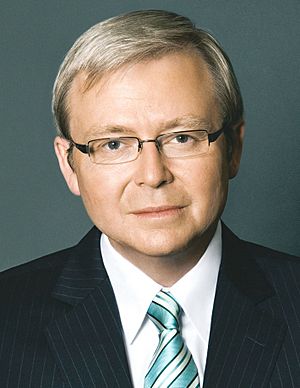
At 9:30 AM on February 13, 2008, Prime Minister Rudd presented the apology. It was a formal proposal to be voted on by the House of Representatives. It is now known as the National Apology.
The apology said:
I move:
That today we honour the Indigenous peoples of this land, the oldest continuing cultures in human history.
We reflect on their past mistreatment.
We reflect in particular on the mistreatment of those who were Stolen Generations—this blemished chapter in our nation's history.
The time has now come for the nation to turn a new page in Australia's history by righting the wrongs of the past and so moving forward with confidence to the future.
We apologise for the laws and policies of successive Parliaments and governments that have inflicted profound grief, suffering and loss on these our fellow Australians.
We apologise especially for the removal of Aboriginal and Torres Strait Islander children from their families, their communities and their country.
For the pain, suffering, and hurt of these Stolen Generations, their descendants and for their families left behind, we say sorry.
To the mothers and the fathers, the brothers and the sisters, for the breaking up of families and communities, we say sorry.
And for the indignity and degradation thus inflicted on a proud people and a proud culture, we say sorry.
We the Parliament of Australia respectfully request that this apology be received in the spirit in which it is offered as part of the healing of the nation.
For the future we take heart; resolving that this new page in the history of our great continent can now be written.
We today take this first step by acknowledging the past and laying claim to a future that embraces all Australians.
A future where this Parliament resolves that the injustices of the past must never, never happen again.
A future where we harness the determination of all Australians, Indigenous and non-Indigenous, to close the gap that lies between us in life expectancy, educational achievement, and economic opportunity.
A future where we embrace the possibility of new solutions to enduring problems where old approaches have failed.
A future based on mutual respect, mutual resolve and mutual responsibility.
A future where all Australians, whatever their origins, are truly equal partners, with equal opportunities and with an equal stake in shaping the next chapter in the history of this great country, Australia.– Kevin Rudd, Prime Minister of Australia, 13 February 2008, at a sitting of the Parliament of Australia.
The apology did not talk about paying money to Aboriginal people or to the Stolen Generations. After reading the apology, Rudd gave a 20-minute speech. He explained why this apology was so important for Australia.
The Opposition Leader's Response
After Prime Minister Rudd, the Opposition Leader, Dr Brendan Nelson, spoke. He offered his party's support for the apology.
He said:
In rising to speak strongly in support of this motion I recognise the Ngunnawal, first peoples of this Canberra land.
Today our nation crosses a threshold. We formally offer an apology. We say sorry to those Aboriginal people forcibly removed from their families through the first seven decades of the 20th century. In doing so, we reach from within ourselves to our past, those whose lives connect us to it, and in deep understanding of its importance to our future. We will be at our best today and every day if we pause to place ourselves in the shoes of others, imbued with the imaginative capacity to see this issue through their eyes with decency and respect.
Nelson's speech also talked about how some people who removed children might have had good intentions. He said they might have thought they were helping. But he also explained that not knowing your family or where you come from can cause deep pain.
He said:
"It is reasonably argued that removal from squalor led to better lives: children fed, housed and educated for an adult world which they could not have imagined. However, from my life as a family doctor and knowing the impact of my own father’s removal from his unmarried ... mother, I know that not knowing who you are is the source of deep, scarring sorrows, the real meaning of which can be known only to those who have endured it [...]
Our generation does not own these actions, nor should it feel guilt for what was done in many, but certainly not all, cases with the best of intentions. But in saying we are sorry, and deeply so, we remind ourselves that each generation lives in ignorance of the long-term consequences of its decisions and actions. Even when motivated by inherent humanity and decency to reach out to the dispossessed in extreme adversity, our actions can have unintended outcomes. As such, many decent Australians are hurt by accusations of theft in relation to their good intentions."
He also mentioned other problems faced by Aboriginal communities.
After the speeches, the House of Representatives voted. They all agreed to the apology motion. However, six members from Nelson's party left the House to show they disagreed. One other member chose not to vote.
Inside Parliament, Nelson's speech was met with applause. Prime Minister Rudd and Nelson met with Indigenous leaders, showing unity. Former Prime Ministers like Gough Whitlam and Paul Keating praised Nelson's speech.
However, outside Parliament, some people reacted differently. In Canberra, some people turned their backs during Nelson's speech. In other cities like Perth and Sydney, there were boos and walk-outs. Some Indigenous leaders felt that Nelson's speech took away from the main message of the apology.
Senate's Decision
Later that day, the Australian Senate also discussed the apology. Senator Bob Brown from the Australian Greens tried to add words to the apology. He wanted it to include a promise to pay money to those who suffered. But all other parties disagreed. The Senate then passed the original apology motion without changes.
See Also
 In Spanish: Disculpa a los pueblos indígenas de Australia para niños
In Spanish: Disculpa a los pueblos indígenas de Australia para niños
- National Sorry Day
- Reconciliation in Australia
- Redfern Park speech
 | Charles R. Drew |
 | Benjamin Banneker |
 | Jane C. Wright |
 | Roger Arliner Young |


